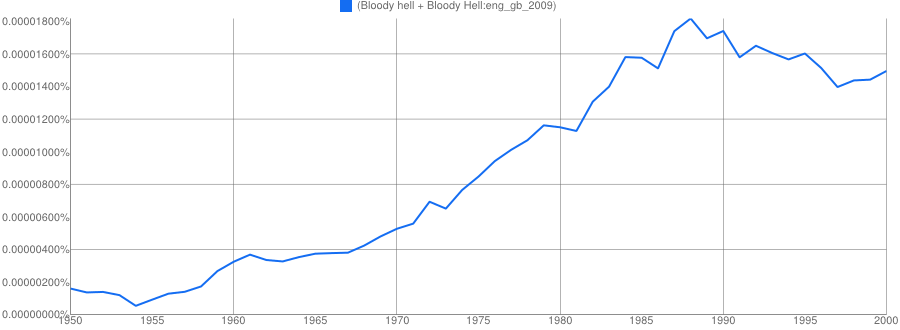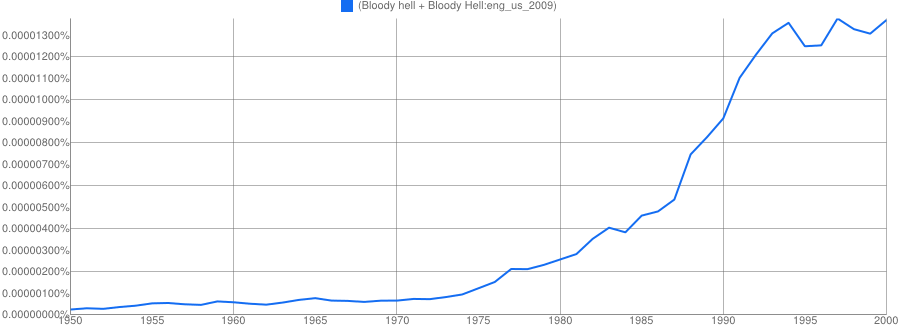Why is the word bloody considered offensive in Britain — where it is used as an adjectival expletive — but not so in the US?
4 Answers
I don't think it's obscene so much as profane. By one theory, "Bloody" in this context is a contraction for "by our lady", essentially swearing by the Virgin Mary (Bloody in Wikipedia). Other similar oaths include "blimey" (God blind me) and "gadzooks" (by God's hooks (hands)). As to why "Bloody" is considered obscene/profane in the UK more than in the US, I think that's a reflection of a stronger Catholic presence, historically, in the UK than in the US, if we're accepting the above etymology, as Catholics venerate the Virgin to a greater extent than Protestants.
All of which is void, of course, if the etymology is incorrect.
-
1With blimey and gadzooks, don't forget zounds ("God's wounds").– chaosCommented Feb 12, 2011 at 5:19
-
2
-
"I don't think it's obscene so much as profane." Obscenity and profanity are synonyms, so it is both. A word is obscene if it is deemed so by society. In the US, hell is considered profanity, if used in a certain context, but not in the UK.– user38347Commented Feb 27, 2013 at 4:07
-
3@Brent: you need to check the definition of profane. "Hell" and "God" (as exclamations or interjections) are profanities, whether considered obscene or not. (In a purely atheist society, presumably they would be neither; but they wouldn't be much use to relieve your feelings, either.) Commented Feb 27, 2013 at 15:01
-
1Even your source (Wikipedia) notes this particular etymology is considered dubious, and quotes two etymologists who doubt it. This article says "this is another urban legend that turns out to be false".– HugoCommented May 27, 2013 at 5:36
Here’s the OED’s comment on the origins:
The origin is not quite certain; but there is good reason to think that it was at first a reference to the habits of the ‘bloods’ or aristocratic rowdies of the end of the 17th and beginning of the 18th c. The phrase ‘bloody drunk’ was apparently = ‘as drunk as a blood’ (cf. ‘as drunk as a lord’); thence it was extended to kindred expressions, and at length to others; probably, in later times, its associations with bloodshed and murder (cf. a bloody battle, a bloody butcher) have recommended it to the rough classes as a word that appeals to their imagination.
-
Your OED citation was posted a while ago, but the issue has come up again. I can't find your cited text anywhere in the OED entry for "bloody". Did I miss something, or has it maybe been altered since you posted? In which case, are the changes significant? I'm currently very much taken with the By Our Lady theory, particularly taking account of the Shakespeare/Swift references. Commented Mar 5, 2014 at 17:19
-
The latest revision is March 2012, which postdates my answer. The etymology now begins ‘The origin of the intensifying use of the adjective and adverb is uncertain and disputed.’ But it rejects the idea that the usage ‘derives from oaths referring to the blood of Christ’ and that it ‘shows either a reduced form of, or a euphemistic alteration of, “byrlady”.’ The argument in both cases is that ‘none of these interjections is recorded in intensive use themselves, and secondly that a functional shift from interjection to intensifier would be highly unusual.’ Commented Mar 5, 2014 at 18:22
-
I wouldn't say it explicitly rejects the "By'r Lady" theory. It just says this "seems unlikely ... firstly that none of these interjections is recorded in intensive use themselves, and secondly that a functional shift from interjection to intensifier would be highly unusual." But Wikipedia's Swift citations seem to leave OED dead in the water on both those points. Commented Mar 5, 2014 at 18:42
-
The OED’s etymological note ends with ‘In many cases in the late 16th and early 17th centuries . . . it is unclear whether “bloody” refers to real blood, bloodshed, or bloodthirstiness, or is an intensifier. It seems likely that the intensifying uses of “bloody” arose from semantic bleaching in formations of this type. Compare, with similar semantic development, Middle French “sanglant” covered with blood (c1100 in Old French), hateful, despicable, (as an extreme intensifier and pejorative) accursed, damned (both mid 14th cent.; also 15th cent. in various imprecatory formulae).’ Commented Mar 5, 2014 at 19:01
I always thought "bloody" was a reference to the blood of christ. kind of like "suffering Jesus" if you've ever heard that.
edit: I see that this interpretation is also listed on Wikipedia, nonetheless, it uses something of religious value and turns it into an expletive. I think it's more offensive in the UK than the US because it started in the UK, and people actually know what it means, whereas in the US "bloody" is just a funny British curse word. Don't know if that helps in any way.
-
I would say only the type of people who write letters to the Daily Telegraph newspaper know where 'bloody' comes from. I think one reason it is used less often in the US because the vowel sounds don't fit most US accents. Commented Feb 12, 2011 at 9:42
Comparing UK usage...
...to US usage, I think it's quite clear that US usage lags behind the UK here. Bear in mind that sheer weight of numbers normally puts the US ahead, so any suggestion of the opposite trend should probably be seen as more pronounced (and significant) than the charts might suggest.
Also compare prevalence values in British and American corpuses for stupid bloody, to see this more obviously "intensifier" usage is almost three times more common in the UK than in the US. For example, I hear things like "You bloody idiot!" all the time in both real life and British movies, but in American movies (and, I suppose, real life) it's much more likely to be "You fucking idiot!".
I think what this means is that many middle-aged and older Americans (the age range most likely to be defining any usage as "obscene") barely even encountered adjectival bloody when they were growing up. So they had no predisposition to rail against it when the younger generation started using it more. The etymology of the word (which has been addressed repeatedly on ELU) is at best uncertain, but most likely few Americans automatically perceive it as blasphemous/profane. So to many of them, it's just another blinking, blooming, freaking, flaming, flipping mild "cuss word".
Brits, on the other hand, were using it a generation earlier - back in the days when using even relatively mild curse words was generally considered a "bad thing".
-
G B Shaw famously has Eliza Doolittle say "Not bloody likely" in 'Pygmalion' (1913), which was then considered very daring. Commented Mar 15, 2016 at 18:03
-
<sigh> How times have changed. At the time, Shaw's line was supposed to be an accurate reflection of "Cockney" speech, but to me today it seems quintessentially Australian. (As a Cockney / Estuary English speaker myself, I find it seems a little "dated" without an Oz accent). Commented Mar 15, 2016 at 18:19


